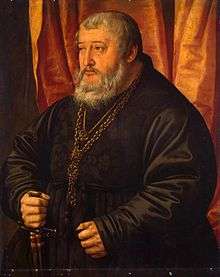Otto Henry, Elector Palatine
Otto-Henry, Elector Palatine, (German: Ottheinrich; 10 April 1502, Amberg[1] – 12 February 1559, Heidelberg)[2] a member of the Wittelsbach dynasty was Count Palatine of Palatinate-Neuburg from 1505 to 1559 and prince elector of the Palatinate from 1556 to 1559. He was a son of Rupert, Count Palatine, third son of Philip, Elector Palatine; and of Elizabeth of Bavaria-Landshut, daughter of George of Bavaria.
Otto-Henry, Elector Palatine | |
|---|---|
 Georg Pencz: Portrait of Prince-elector Otto Henry | |
| Born | 10 April 1502 Amberg |
| Died | 12 February 1559 (aged 56) Heidelberg |
| Noble family | House of Wittelsbach |
| Spouse(s) | Susanna of Bavaria |
| Father | Ruprecht of the Palatinate |
| Mother | Elisabeth of Bavaria-Landshut |
| Religion | Lutheran (from 1540s) Roman Catholic (until 1540s) |
Life
As grandson of George of Bavaria, the young Otto Henry became regent of the new duchy of Palatinate-Neuburg after the Palatinate had lost the Landshut War of Succession against Albert IV, Duke of Bavaria. After the so-called Kölner Spruch (Verdict of Cologne) the duchy was created from the territories north of the Danube for Otto Henry and Philipp, the sons of Ruprecht of the Palatinate. While they were minors, their grandfather Philip, Elector Palatine, ruled the duchy until his death in 1508, followed by Elector Frederick II, their uncle.
In 1541 elector Otto Henry converted to Lutheranism and his palace chapel at Neuburg Castle was the first newly built protestant church of all, consecrated on 25 April 1543 by the reformed theologian Andreas Osiander.
Otto Henry ordered upgrading of Neuburg Castle, patronised the arts[3] and was involved in several conflicts, due to his expensive holding of court a huge burden of debts caused his bankruptcy until he inherited the Electoral Palatinate in 1556. In the 1550s Otto Henry established the Bibliotheca Palatina.
In September 1546 Neuburg was occupied by the troops of Charles V, Holy Roman Emperor as Otto Henry had supported the Schmalkaldic League. In 1552 in occasion of the Peace of Passau Otto Henry could return to Neuburg. As Elector from 1556 he then re-introduced the Protestant Reformation.
Otto Henry married Susanna of Bavaria (1502–43), daughter of Albert IV, Duke of Bavaria, on October 16, 1529 in Neuburg an der Donau.[2] He was her second husband after Casimir, Margrave of Brandenburg-Bayreuth. They had no children, but Susanna brought five of her eleven children to the marriage. She left him a widower 14 years later in 1543.[4]
Otto Henry died in Heidelberg in 1559. He is buried in the Heiliggeistkirche in Heidelberg.[2]
Ancestors
| Ancestors of Otto Henry, Elector Palatine | ||||||||||||||||||||||||||||||||||||||||||||||||||||||||||||||||||||||||||||||||||||||||||||||||||||||||||||||||||||||||||||||||||||||||||||||||||||||||||||||||||||||||||||||||||||||||||||||||||||||||||||||||||||||||||||||||||||||||||||||||||||||||||||||||||||||||||||||||||||||||||||||||||||||||||||||||||||||||||||||||||||||||||||||||||||||||||||||||||||||||||||||||||||||||||||||||||||||||||||||||||||||||||||||||||||||||||||||||||||||||||||||||||||||||||||||||||||||||||||||||||||||||||||||||||||||||||||||||||||||||||||||||||||||||||||||||||||||||||||||||||||||||||||||||||||||||||||||||
|---|---|---|---|---|---|---|---|---|---|---|---|---|---|---|---|---|---|---|---|---|---|---|---|---|---|---|---|---|---|---|---|---|---|---|---|---|---|---|---|---|---|---|---|---|---|---|---|---|---|---|---|---|---|---|---|---|---|---|---|---|---|---|---|---|---|---|---|---|---|---|---|---|---|---|---|---|---|---|---|---|---|---|---|---|---|---|---|---|---|---|---|---|---|---|---|---|---|---|---|---|---|---|---|---|---|---|---|---|---|---|---|---|---|---|---|---|---|---|---|---|---|---|---|---|---|---|---|---|---|---|---|---|---|---|---|---|---|---|---|---|---|---|---|---|---|---|---|---|---|---|---|---|---|---|---|---|---|---|---|---|---|---|---|---|---|---|---|---|---|---|---|---|---|---|---|---|---|---|---|---|---|---|---|---|---|---|---|---|---|---|---|---|---|---|---|---|---|---|---|---|---|---|---|---|---|---|---|---|---|---|---|---|---|---|---|---|---|---|---|---|---|---|---|---|---|---|---|---|---|---|---|---|---|---|---|---|---|---|---|---|---|---|---|---|---|---|---|---|---|---|---|---|---|---|---|---|---|---|---|---|---|---|---|---|---|---|---|---|---|---|---|---|---|---|---|---|---|---|---|---|---|---|---|---|---|---|---|---|---|---|---|---|---|---|---|---|---|---|---|---|---|---|---|---|---|---|---|---|---|---|---|---|---|---|---|---|---|---|---|---|---|---|---|---|---|---|---|---|---|---|---|---|---|---|---|---|---|---|---|---|---|---|---|---|---|---|---|---|---|---|---|---|---|---|---|---|---|---|---|---|---|---|---|---|---|---|---|---|---|---|---|---|---|---|---|---|---|---|---|---|---|---|---|---|---|---|---|---|---|---|---|---|---|---|---|---|---|---|---|---|---|---|---|---|---|---|---|---|---|---|---|---|---|---|---|---|---|---|---|---|---|---|---|---|---|---|---|---|---|---|---|---|---|---|---|---|---|---|---|---|---|---|---|---|---|---|---|---|---|---|---|---|---|---|---|---|---|---|---|---|---|---|---|---|---|---|---|---|---|---|---|---|---|---|---|---|---|---|---|---|---|---|---|---|---|---|---|---|---|---|---|---|---|---|---|---|---|---|---|---|---|---|---|---|---|---|---|---|---|---|---|---|---|---|---|---|---|---|---|---|---|---|---|---|---|---|---|---|---|---|---|---|---|---|---|---|---|---|---|---|---|---|---|---|---|---|---|---|---|---|---|---|---|---|---|---|---|---|---|---|---|---|---|---|---|---|---|---|---|---|---|---|---|---|---|---|---|---|---|---|---|---|---|---|---|---|---|---|---|---|---|---|
| ||||||||||||||||||||||||||||||||||||||||||||||||||||||||||||||||||||||||||||||||||||||||||||||||||||||||||||||||||||||||||||||||||||||||||||||||||||||||||||||||||||||||||||||||||||||||||||||||||||||||||||||||||||||||||||||||||||||||||||||||||||||||||||||||||||||||||||||||||||||||||||||||||||||||||||||||||||||||||||||||||||||||||||||||||||||||||||||||||||||||||||||||||||||||||||||||||||||||||||||||||||||||||||||||||||||||||||||||||||||||||||||||||||||||||||||||||||||||||||||||||||||||||||||||||||||||||||||||||||||||||||||||||||||||||||||||||||||||||||||||||||||||||||||||||||||||||||||||
References
- Andreas Edel, "Ottheinrich," in Neue Deutsche Biographie 19:655.
- Schreiber, KH. "Otto Heinrich". Genealogie Mittelalter (in German). self. Archived from the original on 2010-09-29. Retrieved 2009-10-22.
- This included commissioning the lavishly illuminated 16th century Otthenreich Bible. Forbes, Andrew ; Henley, David (2012). Apocalypse: The Illustrated Book of Revelation (with illuminated illustrations from the Otthenreich Bible). Chiang Mai: Cognoscenti Books. ASIN: B008WAK9SS.
- "Der Fürst". Die Reise des Pfalzgrafen Ottheinrich 1536/1537 (in German). Universitätsbibliothek Würzburg. Retrieved 2009-10-20.
External links
| Wikimedia Commons has media related to Ottheinrich. |
- Andreas Edel (1999), "Ottheinrich", Neue Deutsche Biographie (NDB) (in German), 19, Berlin: Duncker & Humblot, pp. 655–656
- Robert Salzer (1887), "Otto Heinrich", Allgemeine Deutsche Biographie (ADB) (in German), 24, Leipzig: Duncker & Humblot, pp. 713–719
- "Otto Henry, Elector Palatine". Biographisch-Bibliographisches Kirchenlexikon (BBKL) (in German).
- Hans Kilian, Drawings from Elector Ottheinrich's alchemical laboratory
- Digital exhibition of the Ottheinrich-Bible
Otto Henry, Elector Palatine Born: 1502 Died: 1559 | ||
| Regnal titles | ||
|---|---|---|
| New title | Count Palatine of Neuburg 1505–1557 |
Succeeded by Wolfgang |
| Preceded by Frederick II |
Elector Palatine 1556–1559 |
Succeeded by Frederick III |